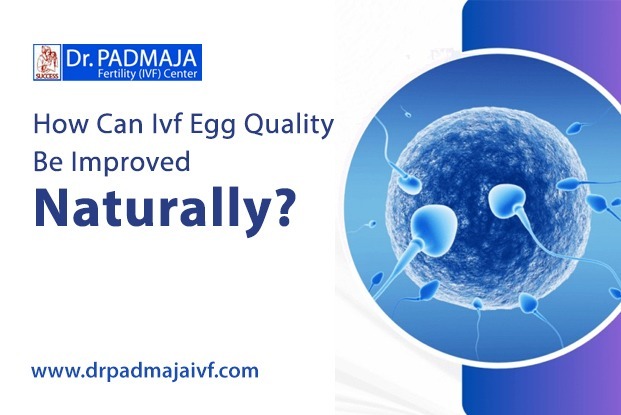Egg quality plays a significant role in the success of In Vitro Fertilization (IVF) treatment. Women with better egg quality tend to have higher chances of a successful pregnancy, as healthy eggs increase the likelihood of embryo implantation and reduce the chances of miscarriage. However, as women age, egg quality can decline, making conception more challenging. If you’re undergoing IVF treatment, especially in centers like the Best IVF Center in Hyderabad, improving egg quality naturally can make a big difference in your fertility journey.
In this blog, we’ll explore how IVF egg quality can be improved naturally, with a focus on lifestyle changes, nutrition, and holistic approaches. We’ll also highlight the expertise of Dr. Padmaja IVF Center and Dr. Padmaja Fertility Center, renowned for their dedication to improving fertility outcomes.
1. Adopt a Fertility-Friendly Diet
A healthy diet rich in antioxidants, healthy fats, and essential vitamins can support egg quality. Consuming foods that nourish your reproductive system helps optimize ovarian function. For instance, foods rich in folate, vitamin D, omega-3 fatty acids, and vitamin E are known to enhance egg quality.
Leafy Greens & Vegetables: Leafy greens like spinach, kale, and broccoli are rich in folate, which helps improve egg quality.
Healthy Fats: Include foods like avocado, nuts, and olive oil, which provide essential fatty acids crucial for hormone balance.
Whole Grains & Antioxidants: Berries, nuts, and seeds provide antioxidants that protect eggs from damage caused by free radicals, a common issue as we age.
It’s important to note that a balanced diet, along with proper hydration, is essential for supporting overall fertility, and many IVF centers, including the Best IVF Center in Hyderabad, emphasize this approach during consultations.
2. Maintain a Healthy Weight
Being either overweight or underweight can affect hormonal balance, which in turn impacts egg quality. Maintaining a healthy weight is crucial for improving your fertility. Excess fat can cause hormonal imbalances, particularly in women with conditions like polycystic ovary syndrome (PCOS), while being underweight can lead to missed periods or reduced ovarian reserve.
If you’re undergoing IVF, your fertility doctor will likely recommend weight management. At Dr. Padmaja IVF Center and Dr. Padmaja Fertility Center, specialists often advise patients on the importance of maintaining an optimal weight for the best chances of success in IVF procedures.
3. Exercise Regularly but Avoid Overtraining
Moderate exercise can improve blood flow to the ovaries, support hormone regulation, and reduce stress—all of which can have a positive effect on egg quality. Aim for activities like walking, yoga, swimming, or light cardio.
However, it’s important not to overdo it. Intense exercise or overtraining can increase cortisol levels, which can negatively impact fertility by affecting hormone production. Experts at Dr. Padmaja IVF Center often suggest a balanced exercise routine that promotes overall health without overtaxing the body.
4. Manage Stress Effectively
Stress is a major factor that can impair fertility. High levels of stress can lead to an increase in cortisol, a hormone that can interfere with the balance of reproductive hormones, negatively affecting egg quality.
To manage stress, consider adopting mindfulness practices like meditation, deep breathing, or yoga. Spending time in nature, enjoying hobbies, or even participating in support groups can also help in reducing anxiety levels. Many patients who visit the Best IVF Center in Hyderabad find that managing stress through mental health support and relaxation techniques can significantly improve their fertility outcomes.
5. Consider Acupuncture
Acupuncture has gained popularity as a natural fertility treatment. Studies have shown that acupuncture can help improve blood flow to the ovaries and regulate hormonal balance, both of which can positively impact egg quality. Some IVF centers, including Dr. Padmaja Fertility Center, integrate acupuncture into their fertility treatments to enhance overall success rates.
6. Take Fertility Supplements
Certain vitamins and minerals can help improve egg quality. Supplements like Coenzyme Q10 (CoQ10), DHEA, vitamin D, and omega-3 fatty acids are known to support reproductive health. CoQ10, in particular, is often recommended by fertility specialists to boost egg quality, especially in women over 35, as it helps improve mitochondrial function in the eggs.
Before starting any supplement regimen, consult your fertility doctor at a trusted IVF center such as Dr. Padmaja IVF Center to ensure you’re taking the right supplements for your specific needs.
7. Avoid Toxins and Environmental Factors
Toxins from environmental pollutants, chemicals in household products, and certain lifestyle habits can harm egg quality. Exposure to pesticides, BPA, or smoking can accelerate the aging of eggs and reduce fertility potential. To improve egg quality, it’s important to avoid these toxins as much as possible.
Experts at Dr. Padmaja Fertility Center often recommend that patients limit exposure to harmful substances and adopt cleaner, more sustainable lifestyle choices to enhance fertility outcomes.
Conclusion
Improving IVF egg quality naturally is not an overnight process, but with commitment and the right strategies, it is possible to enhance your fertility potential. Incorporating a balanced diet, managing stress, exercising regularly, and avoiding harmful toxins are all essential steps toward improving egg quality. If you’re considering IVF, it’s important to consult with experienced fertility specialists at trusted centers like the Best IVF Center in Hyderabad, Dr. Padmaja IVF Center, or Dr. Padmaja Fertility Center for personalized guidance and treatment. By adopting these natural methods, you can improve your chances of success in IVF and increase the likelihood of achieving a healthy pregnancy.
About The Author :

If Dr. Padmaja Divakar is a public figure or a professional in a specific field, I recommend checking her official website, professional profiles, or reliable online sources for the most up-to-date and accurate information about her background, qualifications, and achievements.
Frequently Asked Questions (faqs)
1.How long does it take to improve egg quality?
Eggs take approximately 90 days (about 3 months) to mature. Therefore, lifestyle changes and interventions typically need at least three months to show results.
2.Can age affect egg quality?
Yes, age is a major factor. Egg quality tends to decline after age 35 due to reduced mitochondrial function and chromosomal abnormalities. However, lifestyle changes may still help improve outcomes.
3.Does stress affect egg quality?
Chronic stress can disrupt hormonal balance and negatively affect ovulation and egg quality. Managing stress through techniques like yoga or meditation can be beneficial.
4.Are supplements necessary for egg quality improvement?
Supplements like CoQ10, vitamin D, and omega-3s can support egg health, but they should be taken under medical guidance.
5.Can diet alone improve egg quality?
Diet plays a significant role, but combining it with other lifestyle changes and medical advice is usually more effective.

